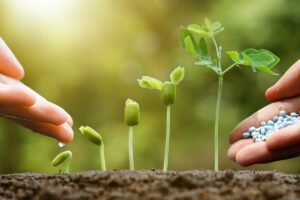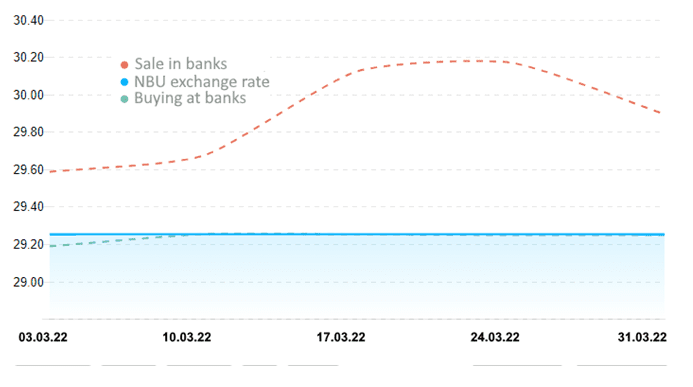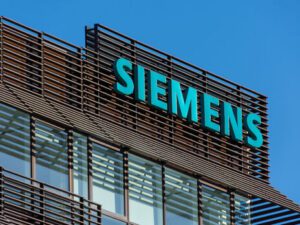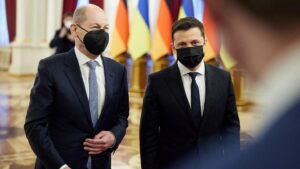
After Canada cancels import duties on Ukrainian goods for a year, Canadian potash fertilizers may become the main ones in the Ukrainian market and thereby replace Belarusian ones, which have not been imported to Ukraine since the beginning of Russia’s armed aggression.
The possible role of Canada in the Ukrainian market of potash fertilizers was reported by the Ukrainian Agribusiness Club (UCAB) on Facebook on Thursday.
The report states that Canada is the world’s largest producer and exporter of potash fertilizers. This country produces about 12 million tonnes of such fertilizers, thus occupying 24% of world production. At the same time, in 2021, Ukraine imported 287,500 tonnes of potash fertilizers, of which 69% came from Belarus, while its own production in the country is practically not developed.
“Therefore, Ukrainian farmers need to look for alternative suppliers, and Canada may become one of them. The abolition of import duties may become an additional factor, as it will increase the competitiveness of Ukrainian agricultural products in the Canadian market. Ukraine will be able to purchase potash fertilizers in Canada, in turn, sending its agricultural products, which are in abundance in the Ukrainian market, by the same transport,” the association said in the statement.
Canada imported 2.8 million tonnes of corn, 1.2 million tonnes of sunflower meal, and 0.5 million tonnes of soybeans in 2021, according to UCAB. It is these positions that Ukraine can supply to the Canadian market through the seaports of the Baltic countries.
The association recalled that before aggression of the Russian Federation, Ukraine had insignificant volumes of export deliveries of agricultural products to Canada, which was due not only to the significant territorial remoteness of this country, but also to the rather high development of the Canadian agro-industrial complex. Thus, during 2021, agricultural products worth $29.3 million were delivered to Canada, of which 49% of export revenue was formed by apple juice, 18% by sunflower oil and 11% by soybeans.
However, with the beginning of military aggression of the Russian Federation with the assistance of Belarus and the blockade of Ukrainian seaports by Russian warships, a number of countries canceled import duties on Ukrainian goods to help the Ukrainian economy. These factors may have an impact on Ukrainian foreign economic activity, including the increase in trade between Ukraine and Canada.
As reported, Canada, following the UK and the EU, would cancel all duties on imports of goods from Ukraine, Canadian Prime Minister Justin Trudeau announced on May 8 after meeting with President Volodymyr Zelensky in Kyiv.

Biopharma covers demand of the domestic market for blood products by 100%, it can resume their export, Oksana Muliarchuk, director of the company’s plasma center network, has said.
“The need for blood products is now 100% closed, we are closing the need for all hospitals, including military ones,” she told Interfax-Ukraine.
Muliarchuk explained that the need for such drugs has decreased since the beginning of the war, in particular due to the fact that a significant part of cancer patients who need such drugs have gone abroad.
At the same time, she noted that the Ministry of Health constantly monitors the availability of stocks of blood products in warehouses.
In addition, according to Maliarchuk, Biopharma began to restore the work of its plasma centers. So, for two months since the beginning of the war, plasma centers in Cherkasy and Sumy had been operating, which prepared only blood components, and in early May, the company resumed the work of plasma collection centers in Cherkasy and Kamianske, and is launching the center in Sumy.
“Unfortunately, we have centers where we cannot resume work yet. For example, in Kharkiv we cannot resume work due to hostilities. In Kyiv, the work of a plasma center has not been resumed for technical reasons – we are waiting for the opportunity to equip a bomb shelter in the building where it is located,” she said.
As reported, the Cabinet of Ministers provided for the possibility of lifting a ban on the export of blood products until martial law is lifted on the basis of a reasonable submission from the Ministry of Health, subject to meeting the needs of the healthcare system in such drugs.
Earlier, the biopharmaceutical company Biopharma (Kyiv) announced plans to invest $20-23 million in the development of a network of plasma centers by 2025, build plasma centers and blood centers in every regional center of Ukraine.
Quotes of interbank currency market of Ukraine (UAH for $1, in 01.03.2022-31.03.2022)


The German concern Siemens will leave the Russian market as a result of Russia’s full-scale invasion of Ukraine, the company said in a statement.
Siemens has begun the process of terminating its manufacturing and operating activities.
Siemens recalled that after the start of the Russian war in Ukraine, the company suspended all new operations and international deliveries to the Russian Federation and Belarus. International sanctions and potential countermeasures affect the company’s activities in Russia, in particular, railway maintenance and repair.
Siemens has decided to conduct an orderly exit process from Russia, CEO Roland Bush is quoted as saying.
“We evaluate the impact on our people and will continue to support them to the best of our ability. At the same time, we provide humanitarian assistance to our colleagues and the people of Ukraine and support the calls of the world community for peace,” said the head of Siemens.
At the moment, the Siemens circuit includes, in particular, operations in the field of automation and digitalization for industry, intellectual infrastructure, transport, and distributed power systems. In 2020, the company held a spin off, as a result of which the energy division was separated into a separate Siemens Energy company (as of the end of November 2021, Siemens was the largest shareholder with a 35% share).
Thus, two separate companies are represented in the Russian Federation – Siemens and Siemens Energy.
In Russia, Siemens Energy is one of the main suppliers of power equipment. The company, in particular, owns Siemens Transformers and 65% in a joint venture with Power Machines – Siemens Gas Turbine Technologies (STGT). Siemens Gamesa, also part of Siemens Energy, is a partner of Enel Russia (MOEX: ENRU) in implementing renewable energy projects in Russia.
In addition, in Russia, Siemens and the Sinara group operate a joint venture LLC Ural Locomotives, which serially produces freight mainline DC electric locomotives with a collector traction drive 2ES6 Sinara and with an asynchronous 2ES10 Granit, as well as electric trains Lastochka “and main AC electric locomotives 2ES7.

German Chancellor Olaf Scholz, in a telephone conversation with Ukrainian President Volodymyr Zelensky on Wednesday, received information about the “current situation and the negotiation process” between Russia and Ukraine, according to a press release from the German government.
“The chancellor was informed about the current situation (in Ukraine) and about the negotiation process between Ukraine and Russia, designed to end the conflict,” the document says.
Scholz and Zelensky also discussed “concrete, practical ways” to provide further assistance to Ukraine and “agreed to remain in close contact.”
In addition, according to the document, Scholz “expressed condolences in connection with the death of the first president of independent Ukraine, Leonid Kravchuk.”